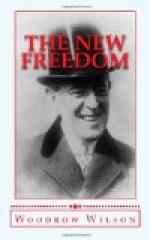I know how some of these gentlemen reason. They say that the influences to which they are yielding are perfectly legitimate influences, but that if they were disclosed they would not be understood. Well, I am very sorry, but nothing is legitimate that cannot be understood. If you cannot explain it properly, then there is something about it that cannot be explained at all. I know from the circumstances of the case, not what is happening, but that something private is happening, and that every time one of these bills gets into committee, something private stops it, and it never comes out again unless forced out by the agitation of the press or the courage and revolt of brave men in the legislature. I have known brave men of that sort. I could name some splendid examples of men who, as representatives of the people, demanded to be told by the chairman of the committee why the bill was not reported, and who, when they could not find out from him, investigated and found out for themselves and brought the bill out by threatening to tell the reason on the floor of the House.
Those are private processes. Those are processes which stand between the people and the things that are promised them, and I say that until you drive all of those things into the open, you are not connected with your government; you are not represented; you are not participants in your government. Such a scheme of government by private understanding deprives you of representation, deprives the people of representative institutions. It has got to be put into the heads of legislators that public business is public business. I hold the opinion that there can be no confidences as against the people with respect to their government, and that it is the duty of every public officer to explain to his fellow-citizens whenever he gets a chance,—explain exactly what is going on inside of his own office.
There is no air so wholesome as the air of utter publicity.
* * * * *
There are other tracts of modern life where jungles have grown up that must be cut down. Take, for example, the entirely illegitimate extensions made of the idea of private property for the benefit of modern corporations and trusts. A modern joint stock corporation cannot in any proper sense be said to base its rights and powers upon the principles of private property. Its powers are wholly derived from legislation. It possesses them for the convenience of business at the sufferance of the public. Its stock is widely owned, passes from hand to hand, brings multitudes of men into its shifting partnerships and connects it with the interests and the investments of whole communities. It is a segment of the public; bears no analogy to a partnership or to the processes by which private property is safeguarded and managed, and should not be suffered to afford any covert whatever to those who are managing it. Its management is of public and general concern, is in a very proper sense everybody’s business. The business of many of those corporations which we call public-service corporations, and which are indispensable to our daily lives and serve us with transportation and light and water and power,—their business, for instance, is clearly public business; and, therefore, we can and must penetrate their affairs by the light of examination and discussion.




